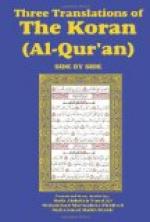6 Ps. xxxv. 9.
7 Lit. the family of the admonition, i.e. Jews and Christians versed in the Pentateuch and Gospel.
8 The idolatrous Arabians regarded Angels as females and daughters of God. But their own preference was always for male offspring. Thus Rabbinism teaches that to be a woman is a great degradation. The modern Jew says in his Daily Prayers, fol. 5, 6, “Blessed art thou, O Lord our God! King of the Universe! who hath not made me a woman.”
9 See Sura lxxxi. 8, p. 45. It is said that the only occasion on which Othman ever shed a tear was when his little daughter, whom he was burying alive, wiped the dust of the grave-earth from his beard.
10 Lit. the likeness of evil to those, etc.
11 The Arabs are curious in and fond of honey: Mecca alone affords eight or nine varieties-green, white, red, and brown. Burton’s Pilgr. iii. 110.
12 Ex. xx. 4.
13 The slave, and the dumb in verse following, are the idols.
14 See Sura [xcvii.] iii. 34, and n. 1, p. 114.
15 Gabriel.
16 This passage has been supposed to refer to Salman the Persian. He did not, however, embrace Islam till a much later period, at Medina. Nöld. p. 110. Mr. Muir thinks that it may refer to Suheib, son of Sinan, “the first fruits of Greece,” as Muhammad styled him, who, while yet a boy, had been carried off by some Greeks as a slave, from Mesopotamia to Syria, brought by a party of the Beni Kalb, and sold to Abdallah ibn Jodda’ân of Mecca. He became rich, and embraced Islam. Dr. Sprenger thinks the person alluded to may have been Addas, a monk of Nineveh, who had settled at Mecca. Life of M. p. 79.
17 This is to be understood of the persecutions endured by the more humble and needy Muslims by their townspeople of Mecca.
18 From Mecca to Medina, i.e. the Mohadjers, to whom also verse 43 refers. Both passages, therefore, are of a later date than the rest of this Sura. Thus Nöldeke. Sprenger, however (Life, p. 159), explains this passage of the seven slaves purchased and manumitted by Abu Bekr. They had been tortured for professing Islam, shortly after Muhammad assumed the Prophetic office.
19 Mecca.
20 Lit. the garment.
21 Comp. Sura [lxxxix.] vi. 119.
22 Comp. Sura [lxxxix.] vi. 147. This verse as well as the following, and verse 125, were probably added at Medina.
23 Antistes. Maracci. Or the text may be literally rendered Abraham was a people, i.e. the people of Abraham; from whom the idolatrous Koreisch pretended to derive their origin.




